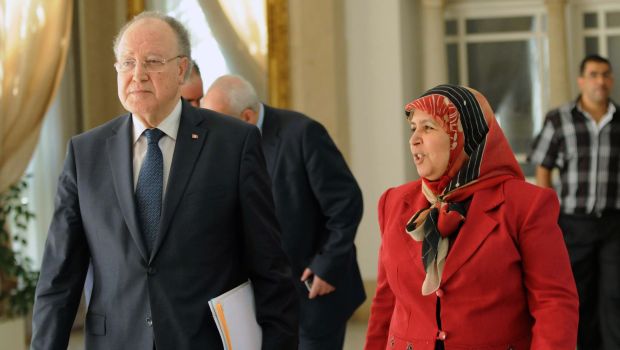
Tunisian Constituent Assembly president Mustapha Ben Jaafar arrives with his vice president, Mahrezia Laabidi, to a meeting as part of the dialogue between the ruling Islamists and the opposition aimed at ending a two-month political crisis, on October 26, 2013, in Tunis. (AFP PHOTO/FETHI BELAID)
Laarayedh’s replacement faces no easy task. Tunisians expect him to be an independent figure able to resolve complex political, security and economic issues and enjoy widespread popular support while preparing the way for the second elections since the 2011 revolution.
Democratic Alliance Party secretary-general Mohamed El-Hamedi told Asharq Al-Awsat that a general meeting of the national dialogue was scheduled for Monday evening. The meeting will be attended by party leaders and will accept nominations before choosing the new prime minister.
Before that meeting, each political party will have to select their first-choice candidate for the premiership. The parties will also select an alternative candidate, who will be put forward if their first choice is rejected. Most political parties have not yet announced their candidates.
Despite the lack of formal acknowledgement of their preferred candidates by the parties, a few names have emerged as front-runners in the race to become interim prime minister. They include former defense minister Abdelkarim Zbidi, former chairman of the Tunisian League for Human Rights Mokhtar Trifi, former central bank governor Mostafa Kamall Nabli, and Ahmed Mestiri, founder of the Movement of Socialist Democrats, the first opposition party during the rule of Habib Bourguiba.
Jalloul Azzouna, the secretary-general of the Popular Front, told Asharq Al-Awsat that initial deliberations within his party favored Mokhtar Trifi. He added that the Popular Front also supported Sana Ben Achour, who if nominated would be the first Tunisian woman to be put forward for the premiership.
Sana Ben Achour is a university professor and member of the Democratic Women’s Organization, which opposed former president Zine El-Abidine Ben Ali. She is related to Sheikh Tahar Sana Ben Achour, one of Tunisia’s most prominent clerics.
The Ennahda Movement, which is currently in power in Tunisia, has suggested Ahmed Mestiri, 88, who opposed Bourguiba’s rule and founded the Movement of Socialist Democrats.
The Tunisian Call Movement, led by Beji Caid El-Sebsi, expressed reservations about Mestiri due to his age and his long absence from the Tunisian political scene. The party will likely nominate Mostafa Kamal Nabli, a former central bank governor. Radi El-Madeb, a respected economist, is their reserve candidate.
In another development in Tunisia, President Moncef Marzouki has issued a decree to establish at least nine military zones in the country. Each zone will encompass areas that have seen armed clashes with terrorist groups over the last few months.
Abdelhamid Chabi, a Tunisian expert on terrorism, told Asharq Al-Awsat that establishing the military zones was proof that the government was determined to fight terrorism wherever it exists. He said that establishing these zones marked a new strategy in Tunisia’s fight against terrorism.
